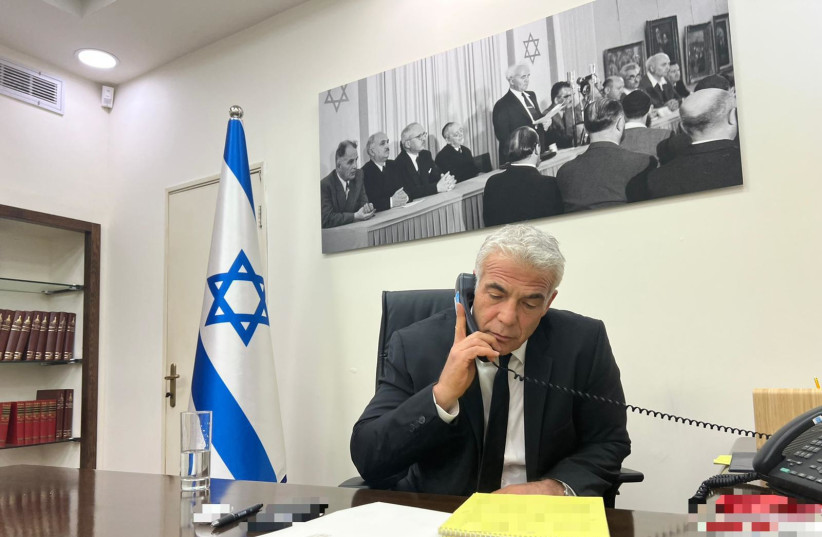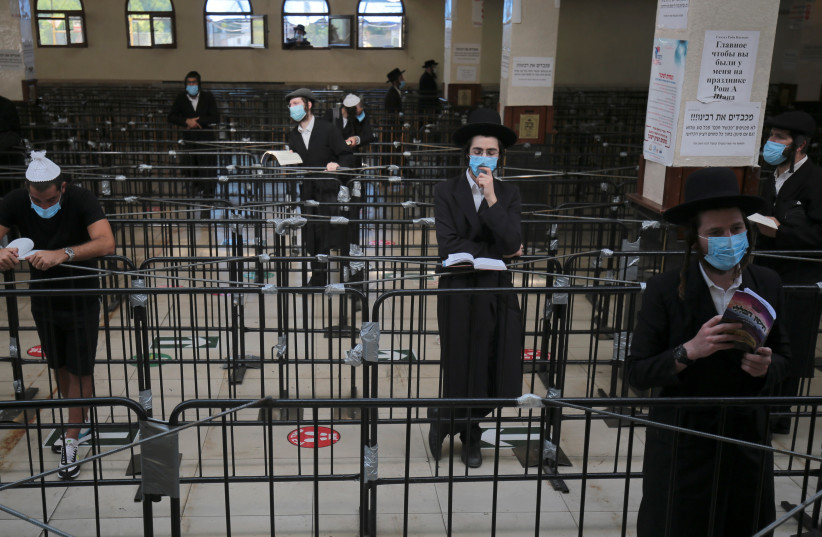Ukrainian President Volodymyr Zelensky called on Israel to join sanctions against Russia following his first-ever phone call with Prime Minister Yair Lapid on Thursday.
“I’ve held the first telephone conversation with the new Prime Minister of Israel Yair Lapid,” Zelensky tweeted. “I count on his country’s accession to the sanctions on Russia and provision of practical assistance to Ukraine in countering the aggression of the Russian Federation.”
Israel has not officially sanctioned Russia or Russian individuals, citing a lack of laws permitting it to do so, but it has moved to ensure that oligarchs cannot use Israel as a haven, or a parking lot for their private jets and it has advised banks to comply with Western sanctions. El Al has also maintained its flights to and from Moscow as Israel says that many Russian Jews are applying to emigrate.
"I count on his country’s accession to the sanctions on Russia and provision of practical assistance to Ukraine in countering the aggression of the Russian Federation.”
Ukrainian President Volodymyr Zelensky
Lapid and Zelensky's different takeaways

The Israeli readout did not mention anything of sanctions. The statement issued by the Prime Minister’s Office said that Lapid had “noted his support of the Ukrainian people,” and “expressed his condolences for those killed and injured in the war, and called for reaching a diplomatic solution in order to end the fighting.”
Lapid also congratulated Zelensky on Ukraine’s 31st Independence Day, which was marked last week, according to the PMO.
After Ukrainian Independence Day passed without a call between Lapid and Zelensky last week, an Israeli media report said the Ukrainian leader had refused to speak to the prime minister because Lapid did not participate in a virtual conference supporting Ukrainian control over Crimea. However, a diplomatic source in Jerusalem denied that report soon after, citing scheduling issues and saying that the call had been rescheduled for September 1.
Lapid has been outspoken against Russia’s invasion of Ukraine, especially compared to his predecessor, Naftali Bennett, who was more cautious in his wording and tried to serve as an intermediary between Moscow and Kyiv.

The prime minister has not, however, made any public statements on the topic since taking office more than two months ago.
In the past, when Zelensky had made demands of Israel, Lapid, as foreign minister, thanked him “for sharing his feelings and the plight of the Ukrainian people.... We will continue to assist the Ukrainian people as much as we can and will never turn our backs to the plight of people who know the horrors of war.”
Zelensky, notably, did not demand military aid this time. Israel has sent hundreds of tons of humanitarian assistance to Ukraine, but not military aid other than helmets and protective vests. Israel cites its deconfliction mechanism with Russia in Syria, allowing the Israel Air Force to attack Iranian targets over its northern border.
Avoiding Uman
Lapid also called on Israelis not to visit the city of Uman, Ukraine, to where thousands of hassidic pilgrims flock each Rosh Hashanah, “in light of the life-threatening danger posed by entering the area of fighting.”
The Foreign Ministry has issued a travel warning against visiting Ukraine and Uman, in particular ahead of the High Holy Days.
“In light of the war and the active battles between Russian and Ukrainian forces, the Foreign Ministry underlines its travel warning for Ukraine and calls on Israeli citizens to avoid visiting Ukrainian territory altogether, including the city of Uman and its surroundings,” the ministry stated.
The warning noted that missiles were fired at Uman a few days ago, killing a Ukrainian civilian and injuring others, and that the Ukrainian government had already issued its own warning against visiting Uman, saying that it cannot take responsibility for pilgrims’ safety.
Jerusalem has also called on Israelis currently in Ukraine to leave the country.
The staff of the Israeli Embassy has not been consistently based in Kyiv and consular services have not been provided in full.
